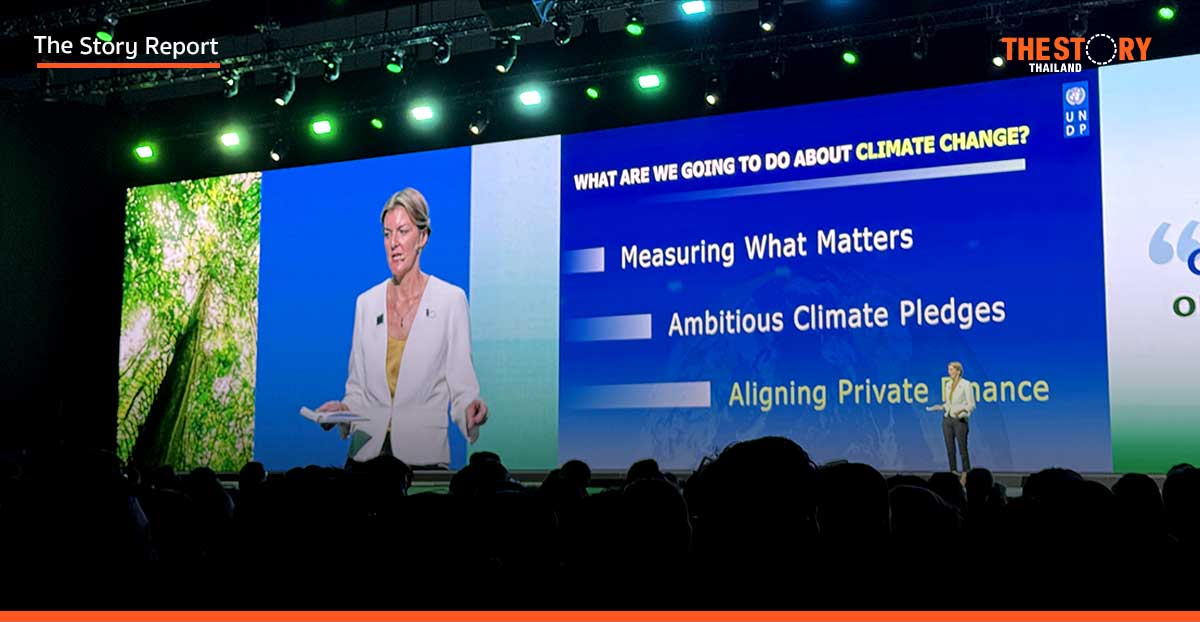The UNDP has asked governments and businesses to contribute more to the efforts to limit global warming and bring a “green transition for this generation and the next”.
Niamh Collier-Smith, Resident Representative of the United Nations Development Programme (UNDP) in Thailand, emphasized the need for ambitious climate pledges from governments worldwide and sustainable investments by the private sector.
She also stressed that the global community needs to rethink progress by focusing on what matters to humans and the planet. It is not just about GDP growth, life expectancy and years of education, but also how the environment is affected by the carbon emission footprint.
“We need to change from a society that values what it measures to a society that measures what it values,” she said in her keynote speech at the recent Sustainability Expo in Bangkok.
The UNDP representative was speaking during a forum titled “ESG Symposium 2024: Driving Inclusive Green Transition” held at the Queen Sirikit National Convention Center. The forum fostered collaboration between governments, business sectors, and civil society to address ESG (environmental, social and governance) issues and support the transition to a low-carbon society.
Every country has to change
According to Collier-Smith, when the UNDP added carbon emissions and material footprint as two more indicators to its Human Development Index in 2020, more than 50 countries dropped out of the ranking’s high positions. “That’s because not one country in the world has managed to achieve very high human development without putting immense strain on the planet,” she explained.
“Low planetary impact and high human development is the next frontier for human development. To get there, every single country has to change,” said the UNDP representative.
She pointed to the need for ambitious climate commitments by United Nations member states, urging them to adhere to their nationally determined contributions (NDCs) and climate pledges under the Paris Agreement.
A legally binding international treaty, the Paris Agreement aims to strengthen the global response to the threat of climate change by keeping a global temperature rise this century below 2 degrees Celsius above pre-industrial levels and to pursue efforts to limit the temperature increase even further to 1.5 degrees Celsius.
Next year marks the 10th anniversary of the Paris climate accord. Collier-Smith said 2025 marks the beginning of a new five-year cycle of commitments to limit global warming to a maximum of 1.5° the temperature rise.
“This is going to be a make-or-break moment,” she said. “We in the United Nations, along with all of our partners, are rolling up our sleeves to help. Right now, UNDP and partners across the world are helping 128 countries to raise the ambition of their nationally determined contributions.”
However, she warned that without the active involvement of the corporate side, “even with the most ambitious NDCs that we can imagine, we are not going to keep the world at a 1.5° temperature increase”.
The next UN Climate Change Conference (aka COP29) to be held in Baku, the capital city of Azerbaijan, in November is expected to discuss the possible shift in investment patterns for a greener planet.
Time to make better choices
Collier-Smith said “remarkable progress” has been made in some industrial sectors. “In terms of cars, one in five new vehicles on the roads today is electric.” However, she reckoned that the problem is most of the corporate investments are flowing to projects in the world’s biggest economies.
“This is self-defeating because in our globalized economy, the disruption to supply chains happened during COVID-19 is going to feel like a hiccup compared to the destruction that we will face in an unchecked climate crisis,” the UNDP representative added.
She suggested that it is time for businesses to make better choices about where to spend money. “It’s time to stop pouring money into the fossil fuel sector and start putting the health of people and planet ahead of short-term stakeholder interests,” she said.
The UNDP is working with 86 countries, including Thailand, on Integrated National Financing Frameworks in their green transition towards the UN Sustainable Development Goals (SDGs), according to Collier-Smith.
“It’s essentially a way of examining all available financing – domestic, international, concessional, public, private – and considering how to take that financing and multiply it so that it catalyzes a shift in our global economy towards the green transition that we are seeking,” she said.
Big support for climate actions
Collier-Smith also pointed to high levels of public support for actions on climate change, as reflected in the results of the UNDP’s latest opinion survey, the Peoples’ Climate Vote 2024.
As many as 80% of those surveyed said they want their country to do more on climate action. Also, 86% of the respondents said they want their countries to work together to address climate change even when their governments disagree on issues like security and trade.
The Peoples’ Climate Vote 2024, described as the world’s largest standalone public opinion survey on climate change, was conducted for eight months last year on more than 73,000 people in 77 countries, representing 87% of the world’s population.
“With ambitious national pledges developed by governments and communities captured in nationally determined contributions, and private flows that accelerate positive change, then we can do what the title of this symposium here in Bangkok calls on us to do: To drive an inclusive green transition for this generation and the next,” Collier-Smith concluded.
SCGD announces long-term strategy in high growth ASEAN markets












